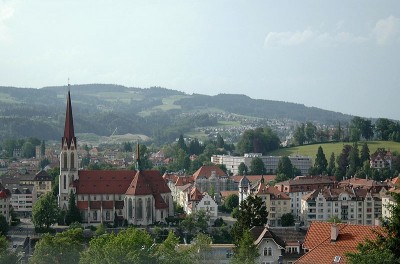Our project’s ECPR workshop in St. Gallen has now been successfully held, drawing participants from three continents and shedding light on a large set of cases. Below, please find the workshop report, which constitutes a brief overview of subjects debated and researchers present at the workshop.
We wish to thank our partners in arranging the workshop, Jo Saglie of the Institute for Social Research and Ann Sullivan of the University of Auckland for a fruitful cooperation; the ECPRfor giving us the chance to arrange this event; and last but in no way least the researchers who participated in the workshop.

St. Gallen, Switzerland (Image: Wikimedia Commons).
Workshop report for workshop 25, ECPR Joint Sessions, St. Gallen 2011:
Indigenous Politics: Mobilization, Representation and Internationalization
by Jo Saglie
The workshop on indigenous politics included 17 papers, with 19 authors attending. The participants had a diverse background. Most were political scientists, but the disciplines of indigenous studies, social anthropology and history were also represented in the workshop. In addition, some papers drew on cooperation with law scholars. Geographically, Norway and Canada were well represented, but the group included participants from Finland, Sweden, New Zealand, Australia, Ireland and the UK as well.
Theoretical and comparative studies were presented, but a majority of the papers were case-studies from a single country. Ephraim Nimni’s paper discussed the significance of indigenous representation for normative political theory on self-determination, while John Coakley’s paper compared indigenous peoples with other minorities. Jane Robbins compared representative institutions for indigenous peoples in seven countries, whereas Martin Papillonanalysed the impact of federalism on indigenous self-determination in Canada and the US.
Three case studies were Canadian: Peter Kulchyski discussed two cases of land claims and resource development, Christa Scholtz analysed indigenous mobilization and vote in a national referendum, and Janique Dubois examined non-territorial self-government for the Métis people.
The Australian case was explored in Ciaran O’Faircheallaigh’s paper on indigenous participation in natural gas development, while Ann Sullivan analysed the lack of Māori representation in New Zealand’s local government.
The remaining papers dealt with the Sámi of Northern Europe. Mikkel Berg-Nordlie studied the Russian Sámi and their relation to the Nordic pan-Sámi cooperation, Patrik Lanttoanalysed the Swedish Sámi movement and their strategies, and Tanja Joona discussed Sámi land rights in Finland. Five papers examined different aspects of the Norwegian Sámi Parliament: its electoral register (Torunn Pettersen), Sámi identity and citizenship (Anne Julie Semb and Kristin Strømsnes), media coverage of the elections (Eva Josefsen), political cleavages (Johannes Bergh and Jo Saglie), and the management of Sámi cultural heritage (Marit Myrvoll).
The basic theme for most papers was the concept of self-determination. Most indigenous peoples do not demand an independent state. The question is then how to achieve self-determination for indigenous peoples within the framework of an existing state, recognizing their special status and their relationship to ancestral lands, but simultaneously acknowledging the rights of other inhabitants on the same territories.
Another central question dealt with identity: how can we delimit an indigenous people? This question arises at the collective level – which nations can be regarded as indigenous – as well as the individual level: which individuals can be regarded as belonging to an indigenous people? In practice, ethnic identities may not be clear-cut, but the concept of indigenous rights requires a distinction between those who are entitled to such rights and those who are not.
Political representation of indigenous peoples was another central concept in many of the papers. Two alternative models are ‘bottom-up’ organizations for indigenous mobilization, and representative institutions created by – or in cooperation with – the state. There are considerable variations in indigenous peoples’ relationship to the political institutions of the states in which they live. Historical factors may be important to explain this variation, such as the existence of treaties between the state and indigenous peoples, state policies towards indigenous peoples (assimilation vs. segregation), and whether indigenous peoples historically has been included in the national political system (by e.g. the right to vote).
Representation is, however, not only a matter of institutions. It is also a process, and some of the papers discussed how indigenous peoples are represented and consulted in policy processes of importance to them, especially regarding resource extraction projects.
Indigenous politics has become internationalized, and this feature was covered in several papers. This is partly a question of indigenous peoples themselves engaging in border-transcending cooperation, as we have seen in e.g. the Sámi case.
Another international aspect, however, is international conventions – especially the ILO convention and the UN Declaration on the Rights of Indigenous Peoples. Workshop papers showed that indigenous peoples can use such international treaties as an instrument when dealing with their national governments. But on the other hand, states may reject to ratify such agreements, or fail to live up to these standards even when they endorse them.
In spite of the diverse background of the workshop participants, and the lack of a ‘standard’ research literature and a common theoretical framework, discussions in the group were generally very good. The non-Europeans and non-political scientists in our group – who were not familiar with the ECPR Joint Sessions – were especially satisfied with this conference format, as it gives more time for discussion and reflection than the panel format.
The workshop directors’ initial aim was to create a meeting place for European and other researchers who are interested in indigenous politics – and we are happy to say that we reached this goal.
In the final discussion of the workshop, the participants agreed that we should try to continue the cooperation that started in St. Gallen. We might proceed with a book project from the workshop, but – more importantly – we will try to establish an institutionalized networkon research into indigenous politics.
